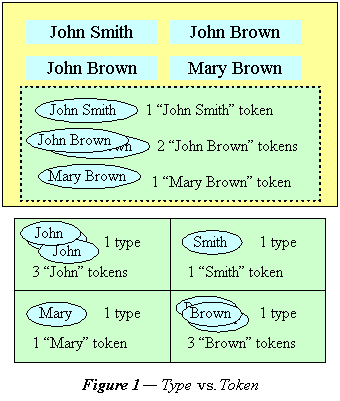
5.1 Tokens vs. types. A compound is like many other phrases that are composed of elements of different kinds. When the parser analyzes a compound, it may categorize its parts in more than one way. These various categories are designated the types of the name pieces. Tokens contrast with types. In linguistics a token is spoken of as a particular instance. At the level of the raw data, each time a name refers to something it is a token. But each distinct spelling is a type. Figure 1 illustrates the important distinction between types and tokens. The names backgrounded in yellow are meant to be particular instances of their referring to different people.

In the analysis of a name phrase the use of either the word type or the word token might correspond to a name string, any logical part of the string, or the actual spelling of the name piece. When I speak of Joannis, I am talking about an individual person, using the genitive form of the person’s praenomen as an identifier. When I speak of “Joannis,” linguistically I am talking about the masculine praenomen having the forn usual for its genitive case. The second occurrence of the name may be considered a type of the first occurrence, where the name refers at some particular time. In terms of the PS-RULES this name form might be ambiguously a personal name phrase, a given name phrase, etc., i.e., its category. What are categories in the grammar rules are linguistically types of their occurrences in the language. The particular instance of “Joannis” that refers to my friend having the name “Joannes” is a single token of the “John” type. The idea of name category (praenomen oblique case form — praenomen citation form — praenomen) grouping is to generalize on the concept of a single name piece.

What we want is that comparison algorithms that might see tokens in disagreement, in particular ones that are ostensibly of different types, i.e., those that are spelled differently, will relate to an equivalent class. We want the algorithms to use a form that they see in agreement, i.e., instances of the same type. This means that a given name type of “Joannem” may group with “Joannes” so that their tokens will be variants. In turn a given name token “Joannes” could be grouped with “John” as variants of the same type. We might designate the most general name group as <John>. Now, instead of referring to Joanne (the person with name in dative case) with a token of “Joannes,” we may refer to him with a token of <John>.
